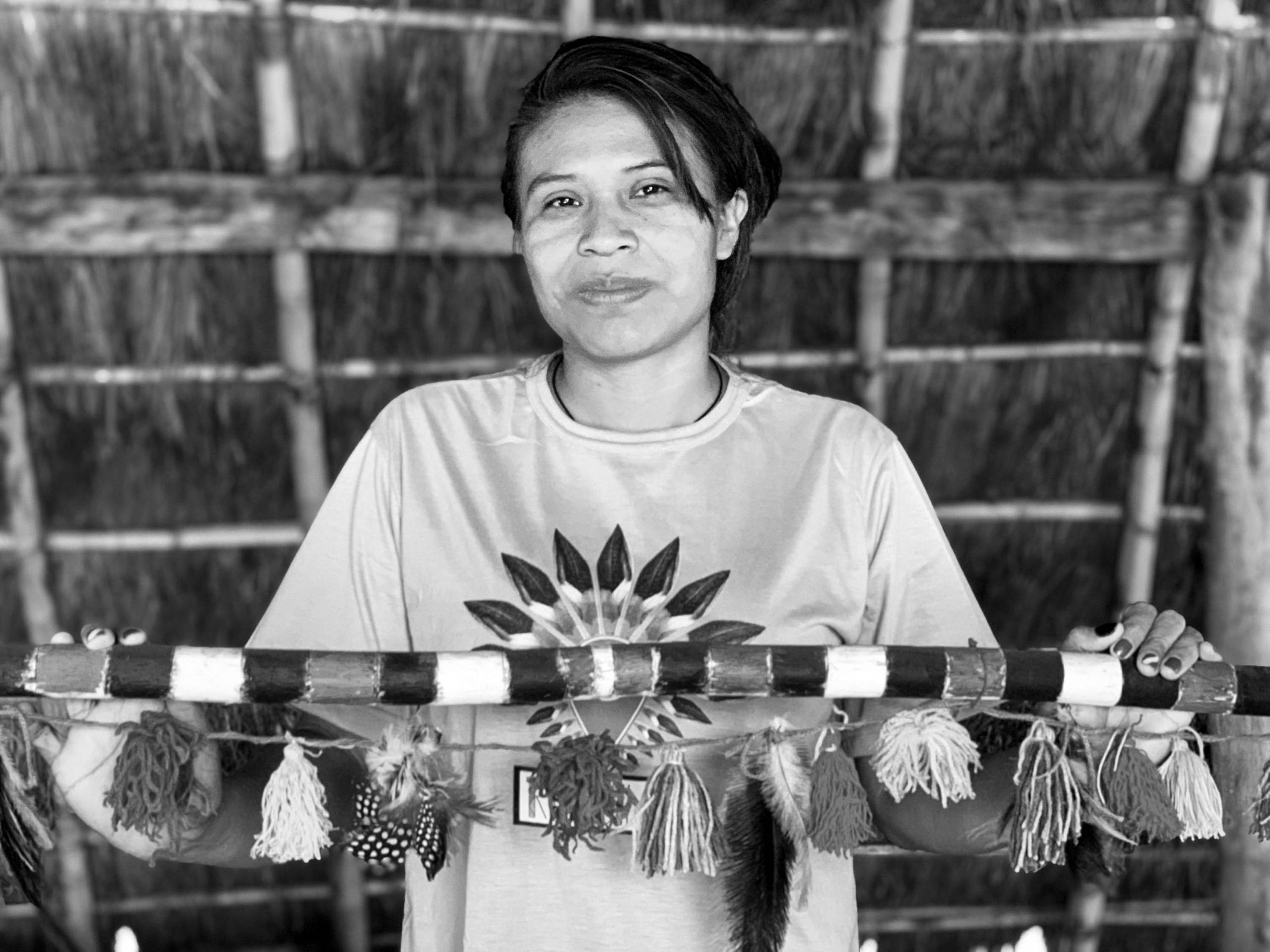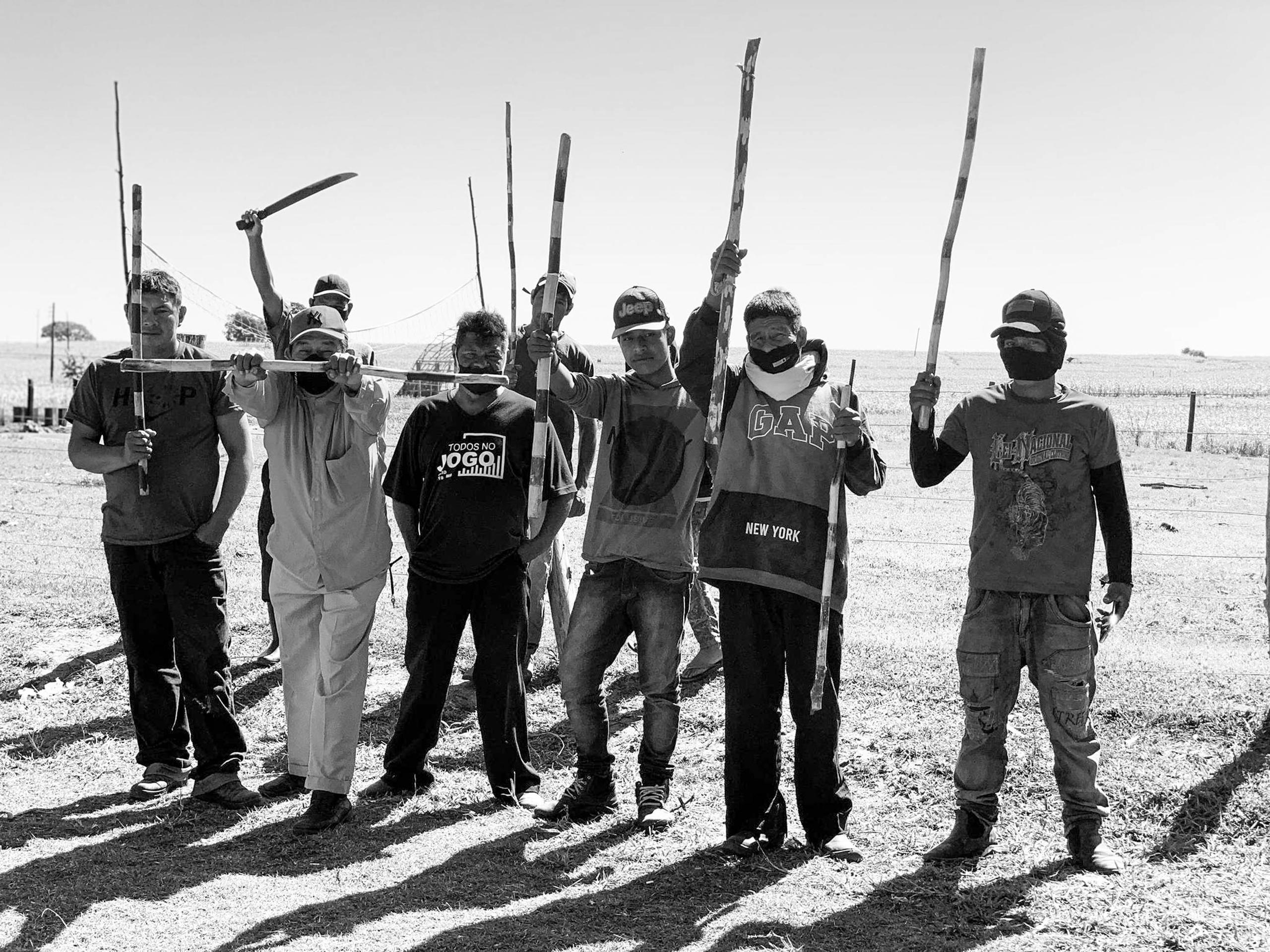
‘We need the international community to listen to us’

A new generation of indigenous leaders in Brazil says the fight for their rights has intensified under the far-right government of Jair Bolsonaro. Visiting Geneva this week, Erileide Domingues, the head of one of the many indigenous tribes in Brazil warns they face “extermination” if Bolsonaro is re-elected as president in October. SWI inverviewed her in her ancestral land in Amambai a municipality in the south east of the country.
With a mobile in one hand and a tablet in the other, Domingues makes sure that each indigenous family get their share of food. The supplies, ranging from beans to sugar, are sent once a month by the Brazilian government to her land near the border with Paraguay. Leader of the Guyra Roka community, located in the southeastern state of Mato Grosso do Sol, she is the one responsible for maintaining contacts with authorities and assuring no one is left behind.
Articulate, young and a woman, Domingues is part of the new generation of Brazilian indigenous leaders. She is ready to take the mantle from the elders to ensure the survival of their people and their traditional way of life based on ancestral relationship with the land. She says the biggest threat her community faces today is the far-right government of Jair Bolsonaro. The current president has the support of around a third of voters in Brazil and still believes he can overcome the popularity of Luiz Inácio Lula da Silva, currently the favorite to win the elections in October.
Domingues decided she had to travel all the way to Switzerland to sound the alarm. “If he stays, it is extermination,” says Domingues, also one of the main indigenous leaders in the region of Guyraroka. She is in Switzerland this week to bring attention to the plight of her community at the United Nations.
It’s been four years since Bolsonaro became president of Brazil and unrolled what critics consider an anti-human rights agenda. Indigenous communities in the Latin American country say they are living in a state of “war”; a war for their land and their survival. They say they are under constant attack by gunmen, by ranchers, by the police and by drug lords.
With Brazil’s presidential elections just around the corner, SWI Swissinfo.ch traveled hundreds of kilometers between different indigenous lands and reserves in Mato do Grosso, in July. The region is one of the most dangerous areas of Brazil for indigenous communities and a key export hub of the country’s food production, primarily soybeans.
UN visit
Domingues laid out these and other claims to the United Nations this week in Geneva. She was one of the few indigenous leaders chosen to represent the challenges faced by these groups when the Human Rights Council evaluates the human rights situation in Brazil in the second half of November. She hopes her voice can resonate both at public events at the UN, as well as in private meeting with human rights officers at the global institution.

Her presence in Switzerland reflects a drastic change in the history of indigenous activism in Brazil. For decades, it was the older men from these communities who would represent their interests – to the government and on occasion to the world. Women’s political gains in Latin America over the last ten years has shaken up traditional power dynamics across society, including indigenous communities.
Dominigues, who completed high school, says exercising leadership as a woman is not without challenges in her community or when dealing with the authorities. There is still a tendency for women to be underestimated and she might feel less safe than male peers in certain situations. But, she insists, women leaders like her are the new reality. And she is even considering taking English lessons to better advance indigenous rights in the international arena.
“Now it is up to us,” says the 31-year-old leader. For the last five years, she progressively assumed her responsibilities, replacing her grandfather, now 104 years old. The dramatic episodes of the last few years, according to Domingues, have accelerated the transfer of power in her community. “There are fewer and fewer elders. On many occasions, I hold my grandfathers’ arm and tell him I am here to help.”

The conflict between her community and the authorities centers on land. Traditional indigenous territories in Brazil like hers are protected by the constitution. But, in order to guarantee such status, the government needs to recognise and declare each area as a protected land.
Bolsonaro considers indigenous communities have too much territory and that these holdings stand in the way of economic development. Since taking office, he has assured that no further land would be granted such special protection status, allowing loggers, mining and farmers to encroach and clash with these local communities.
“Enough of lies”
In face of such a reality, Domingues’ voice resonated at the UN this week with a mix of indignation and defiance. “Enough of lies by the Brazilian authorities”, she said in a meeting with governments from every part of the world. While she spoke, the Brazilian ambassador to the UN, Tovar Nunes, was in the first row, listening carefully to her.
The Brazilian government did not respond to her attacks. But, before she spoke, Nunes assured all participants in that meeting he “shared” the same interest in promoting human rights.
Over the past months, the Brazilian mission in Geneva has repeated the mantra that protecting the indigenous groups is a priority of the current government, a statement disputed by human rights activists.
During her multiple meetings in Geneva, she asked countries and the UN itself to put pressure on Brazil to assure that land would be given to the indigenous groups. “We exist. We are a reality”, she says, wearing her traditional ornamentation on her head. “The state is blind, deaf and speechless with us. What we face is a bloodbath.”
She also met with the Swiss mission at the UN and hopes the Swiss government will defend her people’s rights against the Brazilian government.
Increased violence
The territory where Domingues community lives is a Guarani-Kaiowá land. About 150 years ago, indigenous communities occupied an area of nearly 40,000 square kilometers, spanning the border between Brazil and Paraguay. Placed in eight reservations of no more than 36 square kilometers created between 1915 and 1928, indigenous people were victims of a forced displacement that transformed their history.
The expansion of the agricultural frontier and the participation of Mato Grosso do Sul as one of the exporting hubs of commodities from Brazil to the world set the stage for the debate over indigenous people rights in the region. Gradually, the reserves became even smaller and indigenous territories descended into a state of lawlessness with ranchers, loggers, miners all wreaking havoc in the region.
This has translated into unprecedented bloodshed in one of the most productive agricultural areas of the planet.
According to the Brazilian Forum for Public Security, 2,000 indigenous people were murdered between 2009 and 2019. A jump of 21% was registered in 2019, the first year of the current government.
Open graves
What Domingues brings to Geneva is the outburst of rage among these communities due to the constant fear of death. One of the cases that most stirred the local population was the murder of an indigenous man in the Taquaperi region, near the border with Paraguay and in the municipality of Coronel Sapucaia earlier this year. Over decades, the indigenous territory had been reduced to a fraction of what it was and faced with the prospect of landlessness, several members of the community began to occupy new areas and forced the land owners to flee. Armed confrontations between indigenous people and ranchers exploded.

On May 21, while out looking for wood, Guarani-Kaoiwá Alex Lopes was shot eight times and killed near one of the farms in the region. His body was thrown into a creek near the border with Paraguay.
As a response to the murder, the indigenous people decided to invade the farm’s headquarters and occupy it. Since then, there have been ongoing tensions with the ranchers.
This example which Domingues brings to the UN is representative of the violence they face. “We need the international community to listen to us. We need to occupy this space and to travel,” she says.
If Bolsonaro is reelected, the indigenous leader warns that the threats will increase and that a concerted international action will be needed to help them.
“We are aware that no government will be capable to answer to our need. But the path will be worsened if he wins again and we will never feel at home. It is something that hurts us,” Domingues claims.
“They want us to fear them. But we will not. If we fear them, we won’t be able to tell our children that this is ours.”
Edited by Virginie Mangin, Dominique Soguel

In compliance with the JTI standards
More: SWI swissinfo.ch certified by the Journalism Trust Initiative






























You can find an overview of ongoing debates with our journalists here . Please join us!
If you want to start a conversation about a topic raised in this article or want to report factual errors, email us at english@swissinfo.ch.